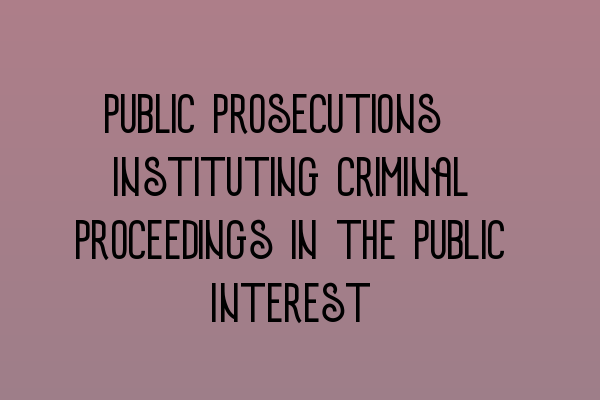Public Prosecutions: Instituting Criminal Proceedings in the Public Interest
At SQE Criminal Law & Practice Law UK, we understand the vital role that public prosecutions play in upholding justice and maintaining the rule of law in the United Kingdom. Instituting criminal proceedings in the public interest requires careful consideration and adherence to legal principles, ensuring fairness and safeguarding the rights of both the accused and the wider community.
The Role of the Prosecution
Prosecutors act as representatives of the state, charged with the responsibility of bringing criminal charges against individuals suspected of committing offenses. Their primary duty is to serve the public interest by seeking justice and holding those responsible accountable for their actions.
Essentially, public prosecutions act as a deterrent, sending a strong message that criminal behavior will not be tolerated and that individuals will face consequences for their actions. This is crucial in maintaining public trust and confidence in the criminal justice system.
Instituting Criminal Proceedings
Before instituting criminal proceedings, prosecutors must carefully assess the evidence available and satisfy themselves that there is a realistic prospect of conviction. The Code for Crown Prosecutors provides guidance on the factors to consider when making this determination.
First and foremost, prosecutors must consider whether the evidence is reliable, admissible, and sufficient to meet the required standard of proof beyond a reasonable doubt. They must also consider the public interest in prosecuting the case and whether a prosecution is necessary and proportionate.
Factors such as the seriousness of the offense, the potential harm caused to individuals or society, and the impact on public confidence in the criminal justice system are all pertinent considerations. Additionally, the circumstances of the accused individual, such as their age, vulnerability, or any previous convictions, may also be relevant.
It is essential for prosecutors to exercise their discretion impartially and independently, ensuring that decisions are made based on the available evidence and the interests of justice.
Working Towards Justice
At SQE Criminal Law & Practice Law UK, we recognize the importance of continuous professional development to enhance the skills and knowledge of aspiring legal professionals. Our workshops and seminars on criminal practice provide an excellent opportunity for practitioners to expand their expertise and stay updated with the latest developments in UK criminal laws.
Staying informed and prepared is vital in the field of criminal law. Our article on updates in UK criminal laws offers valuable insights into recent legislative changes and their implications.
Enhancing your SQE Criminal Law Study Group experience is another way to deepen your understanding of criminal law principles and enhance your ability to navigate complex legal issues.
Decoding criminal evidence rules is an essential skill for any aspiring criminal lawyer. Our detailed analysis provides valuable guidance on understanding and effectively utilizing evidence in criminal proceedings.
Additionally, a deep dive into fraud and financial crimes in the UK offers an in-depth exploration of the legal frameworks and strategies employed in combating financial wrongdoing.
Conclusion
Instituting criminal proceedings in the public interest is a crucial function of the criminal justice system. Prosecutors play a vital role in ensuring that justice is served, and individuals are held accountable for their actions. By adhering to legal principles and considering the public interest, prosecutors demonstrate their commitment to upholding the rule of law and maintaining public confidence.
Visit SQE Criminal Law & Practice Law UK’s website for more information on our workshops, seminars, and resources to support your professional development and enhance your legal career.
